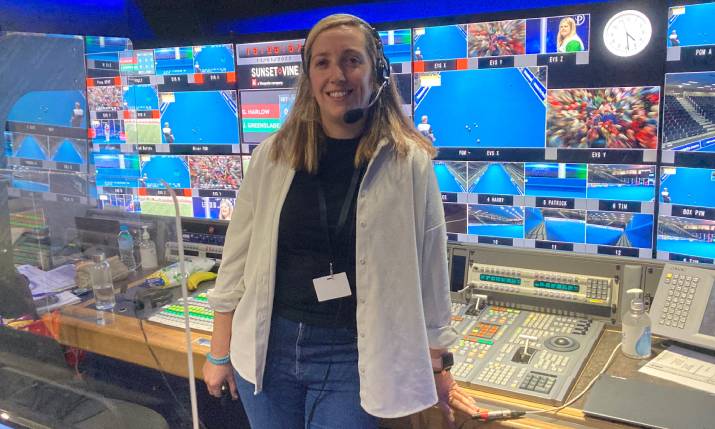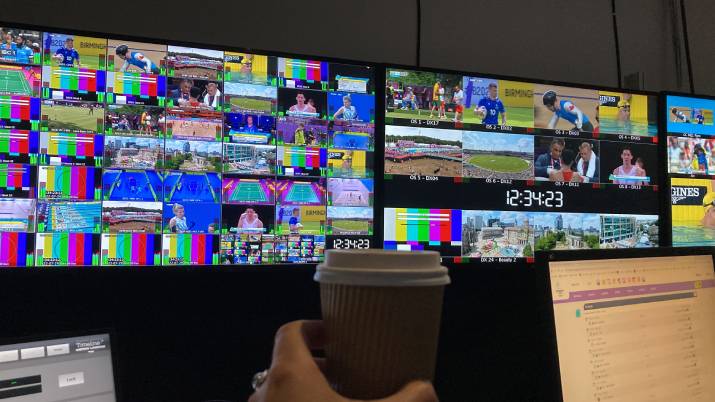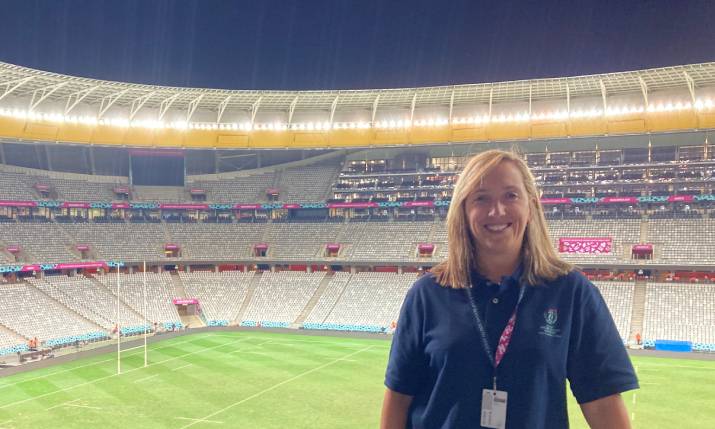Sports fan: Thrills and spills of working on sports broadcasting from Scotland with Sunset+Vine senior producer Amy Thabet

Amy Thabet, senior producer at Sunset+Vine, on location at the World Bowls Championships for BBC in Norfolk
We talk to Amy Thabet, senior producer at Sunset+Vine, about her career in sports broadcasting that has taken her from the Olympics to FIFA World Cups, and now from her home base in Scotland, to a lot more.
What draws you to your career in live sport?
I enjoy working as part of a team and I love watching live sport. You need to be a team player and a good communicator in our industry, and you also need to be a sports fan!
What do you enjoy about working in this industry?
I actually enjoy the fact it’s not a Monday to Friday 9-5 and no day, week or month is ever the same! I am also passionate about sport and watching it, so at times it doesn’t feel like a job! It’s also a job that can often include travel which is a big bonus, as we get to travel and work in different parts of the world which is definitely a positive!
What is hard about working in sports broadcasting?
It’s definitely a learn as you go kind of job! The more experience you get and challenges you face, the better you get. I also think it’s helped me massively by working on different sports for different broadcasters and clients.
“Just know your stuff and back yourself. It doesn’t matter where you come from, what your background is, or what gender you are, so long as you work hard, have the right attitude, have passion and knowledge for the job, then you’ll be just fine”
The hardest thing about live producing is definitely keeping calm and being clear when the live action is happening, and there are a lot of voices in your ear! Also, working weekends all the time can be difficult, and your schedule is dictated by the sporting calendar, but it’s something we are all used to by now!

Sunset+Vine’s Amy Thabet on location at the Commonwealth Games in Birmingham in 2022
What challenges have you faced over the course of your career and how did you get you get past them?
I would say one of the biggest challenges I’ve faced recently is the fact that I am based in Scotland, and there’s definitely a lot less work and opportunity up here than in London. I think things have changed slightly post Covid with remote productions and working from home, but at the start of my career it was very difficult to find a job in Scotland. It’s so competitive and difficult to get started, so I had to move to London and live on a friend’s sofa for a while to get a foot in the door. I was very lucky!
How did you first find out about TV broadcasting as a career? What was your inspiration or idea, and why sports broadcasting?
I’ve always been sports mad and used to play a lot of football, basketball, and badminton as a kid. Football was always my first love, and I would watch it on telly all the time. I studied Film & Media at university, and once I’d decided to get into broadcasting I decided to aim for sports, as it was a subject I knew most about!
What got you from school to university then into the TV business?
I went to Stirling University and studied Film & Media Studies. After graduating I took a year out to travel, then picked up some temp admin work; it didn’t suit me, but it gave me the added drive and incentive to find a job I enjoyed and was passionate about.
I applied to various TV production companies in London for work experience and was both surprised and delighted when Sunset+Vine got back to me and offered me a week’s work experience at their office in central London.

Amy Thabet, senior producer at Sunset+Vine, on location in Cape Town, South Africa, for the 2022 Rugby Sevens World Cup
What was your first job, how did you get it, what did it involve, and how did you feel about it? My first job was actually at Sunset+Vine. My week’s work experience turned into a permanent job as a production secretary. It was a junior role and admin based – which involved booking travel, sorting petty cash, answering calls, coffee runs, managing diaries etc. I was always keen to move into production so offered my services as a runner and Logger at weekends on various productions to learn the ropes and build up experience and contacts.
And then what happened?
After a year at Sunset+Vine in London I moved back to Scotland to work for Setanta Sports, starting as a production coordinator and then moving into production to work as an assistant producer on the football and rugby. I learned loads making VTs, editing highlights and working on live sports OBs.
Unfortunately, Setanta went under, and I was on the hunt for a job again. With very little work in Scotland, I took a job abroad working for Endemol Sport in Abu Dhabi as an assistant producer on their Premier League coverage for Abu Dhabi Sports. After 18 months there, I moved to London to work for ESPN on the Premier League with IMG.
During the summer breaks I also worked on Live@Wimbledon for IMG. As TV rights come and go within our industry, we often find ourselves moving about; so, once ESPN lost the rights to BT Sport, I found myself back working at Sunset+Vine in the Glasgow office, and 12 years on I am still here!
I started working on Scottish football for BT Sports and over the years at Sunset+Vine Glasgow I have worked on Premier League, the Scottish Premier Football League (SPFL), and Champions League/Europa League football for BT Sports, BBC Scotland Football, shinty and rugby, Amazon Prime football and rugby, BBC bowls, FIFA World Cups, World Rugby 7s, Commonwealth Games and The Olympic Games.
Highlights include my first World Cup in Brazil – my first world cup was definitely an experience I’ll never forget, and as football is my first love, working on a World Cup in Brazil was a dream come true – the Paralympics in Rio, the Commonwealth Games in Gold Coast, Australia, the Europa League final in Seville, and producing my first Scotland Rugby match for Amazon Prime at Murrayfield.
The technologies used in sports broadcasting have evolved rapidly over recent years. What for you in your day-to-day job is the most exciting, and also what is the biggest gamechanger for this industry overall?
One of the most exciting is probably all the new and different cameras on offer nowadays. On the live OBs we have batcams, wirecams, Himo and superslos, all sorts of new ENG cameras and lenses so everything is looking better, brighter and sharper. Gone are the days when you sat someone down in front of a single camera for an interview; we now have two or three cameras, including Go Pros and gimbles on ENG shoots, so feature shoots are produced more in depth and look better than ever.
I think the remote production concept is a game changer. For example, we had a gallery set up in the Glasgow office and we would work on the presentation for BT Sport Premier League games, but it was so reliant on technology and the internet. We had a few scares and quite a few shaky moments where we lost comms, pictures etc. But it is amazing to think that you don’t have to be at the ground to make it all work.
What advice would you give to other women looking to move into a role in sports broadcasting like your own?
Just know your stuff and back yourself. It doesn’t matter where you come from, what your background is, or what gender you are, so long as you work hard, have the right attitude, have passion and knowledge for the job, then you’ll be just fine.

